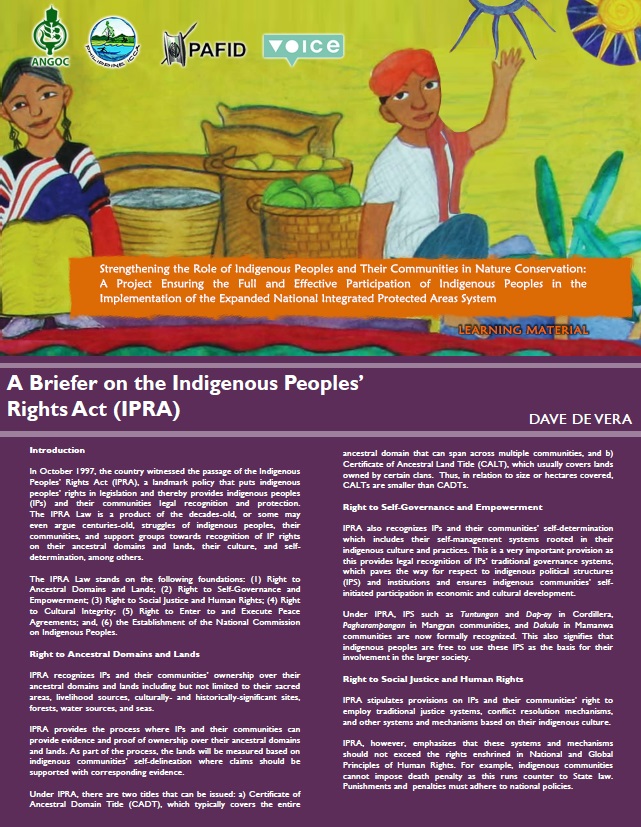
On 22 June 2018, the Enhanced National Integrated Protected Areas System (ENIPAS) Act was enacted and declared in policy that the traditional governance of Indigenous cultural Communities/Indigenous Peoples (ICCs/IPs) shall be recognized within protected areas (PAs).
The ENIPAS is a ground-breaking legislation, first of its kind that clearly states the recognition of contribution to conservation and their traditional governance over Key Biodiversity Areas (KBAs). It is imperative, therefore, that the voice of ICCs/IPs be heard in the implementation of such law – especially through effective representations of their ICCs in their respective Protected Area Management Board (PAMBs).
These learning materials on “A Briefer on the Indigenous Peoples’ Rights Act (IPRA),” “Ang Batas na Indigenous Peoples’ Rights Act (IPRA)” [Tagalog version], and “Usa ka katingaban bahin sa Indigenous Peoples’ Rights Act (IPRA)” [Cebuano version] are three of the 54 handouts (covering 18 topics prepared in English, Tagalog, and Cebuano) produced to provide ICCs/IPs with the relevant knowledge and toolkits to engage with their respective PAMBs.
In particular, these materials discuss the five foundations of the Indigenous Peoples Rights Act (a key policy for IPs and their communities providing the legal basis of indigenous peoples’ rights recognition and protection in the Philippines): (1) Right to Ancestral Domains and Lands; (2) Right to Self-Governance and Empowerment; (3) Right to Social Justice and Human Rights; (4) Right to Cultural Integrity; (5) Right to Enter to and Execute Peace Agreements; and, (6) the Establishment of the National Commission on Indigenous Peoples.
This learning material was prepared by Dave de Vera for the project “Recognizing the Indigenous Communities behind the Conservation of Nature: A Project Pursuing the Full and Effective Participation of Indigenous Communities in the Implementation of the Expanded National Integrated Protected Areas System” Jointly implemented by ANGOC, Bukluran, and PAFID, this initiative is supported through the Sudden Opportunity Grant Facility of VOICE, an initiative by the Netherlands Ministry of Foreign Affairs executed in a consortium between OXFAM Novib, and Hivos.
The views expressed in this material do not necessarily reflect those of VOICE, Netherlands Ministry of Foreign Affairs, OXFAM Novib and Hivos.
